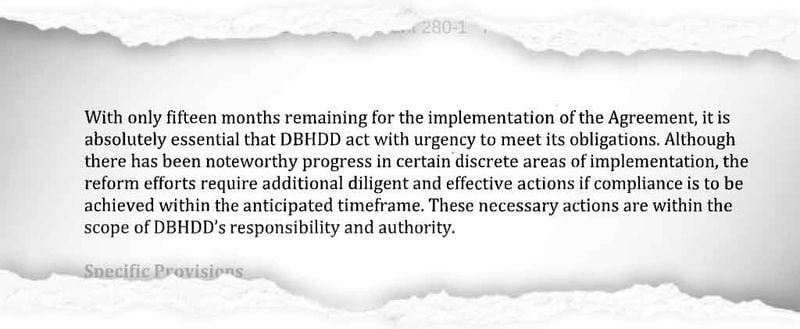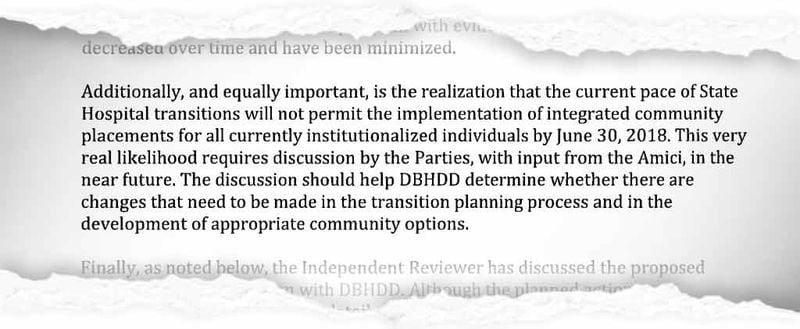Mentally ill patients often left Georgia's state psychiatric hospitals with just a bus token and directions to a homeless shelter.
For people with disabilities, these same institutions became places of permanent confinement.
This is the system that Georgia, under pressure from the federal government, pledged seven years ago to radically overhaul. But with a court-enforced deadline fast approaching, the state increasingly seems unlikely to fulfill its promises.
Georgia has less than 14 months – until June 30, 2018 – to comply with a settlement it reached with the U.S. Department of Justice in 2010. The agreement followed an investigation that concluded the state had systematically violated the rights of people with mental illness and developmental disabilities.
But the state continues to discharge patients with mental illness to places where they are unlikely to get psychiatric treatment: extended-stay motels, for instance, and even the massive Peachtree-Pine homeless shelter in midtown Atlanta. All patients with disabilities are supposed to be moved into group homes or other community-based facilities, but at the current rate of progress, the state might not meet that requirement for another 10 years.
As officials try to comply with the agreement, they also are investigating an alarming number of deaths in community-based treatment: about 350 since 2014. Those apparently include five dozen suicides.
A court-appointed monitor credits the state with making many promised improvements, especially regarding crisis intervention and other services for people with mental illness.
Still, a grim picture emerges from the monitor’s most recent report, as well as from interviews and documents reviewed by The Atlanta Journal-Constitution.
It is “absolutely essential” that the Georgia Department of Behavioral Health and Developmental Disabilities “act with urgency to meet its obligations,” the monitor, Elizabeth Jones, wrote in late March in a report to U.S. District Judge Charles Pannell. “Although there has been noteworthy progress in certain discrete areas of implementation, the reform efforts require additional diligent and effective actions if compliance is to be achieved within the anticipated timeframe.”
Department officials declined to be interviewed.
In a statement, the agency did not say whether it expects to meet the deadlines next year. But the department said it is moving at “a reasonable pace” to move. “Transitions are carefully and individually planned to meet the unique needs and preferences of each individual and to provide the best opportunities for success in the community.”
The agency said it welcomed the monitor’s “reflections and recommendations.”
The Justice Department began investigating Georgia's psychiatric hospitals in 2007 after a Journal-Constitution series, "A Hidden Shame," exposed a pattern of poor medical care, abuse, neglect and bad management that had caused dozens of unnecessary deaths.
Transforming a historically troubled mental health system has been a slower process than perhaps anyone envisioned when state and federal authorities put together a plan. Already, a judge extended the deadline for compliance once, from 2015 to 2018.
The state has spent millions of dollars and reorganized the bureaucracy that oversees the hospitals and community treatment. It also closed two state hospitals, in Rome and Thomasville. All that's left of Central State Hospital, the notorious facility in Milledgeville that once warehoused as many as 12,000 people, is a unit for people committed through the criminal justice system.
The state complied with hundreds of provisions from the settlement agreement with ease. But several issues have proved insoluble.
For instance, despite promising to provide “supported” housing to 9,000 people with mental illness, the state has managed to find such homes for fewer than 2,500 former hospital patients, according to the monitor’s report.
Vouchers that pay for the housing have been “a game changer for the people who have gotten the housing vouchers,” said Talley Wells, who runs Atlanta Legal Aid’s disability integration project. “But the reality is we still have a long way to go to complete the settlement. The state made a commitment to 9,000 people to provide this game-changing housing.”
In past years, the state hospitals, especially Georgia Regional Hospital/Atlanta, sent scores of newly discharged patients to locations where continued treatment seemed unlikely: homeless shelters, street corners, even an abandoned van on a street in Atlanta’s West End.
But from 2016 to 2017, according to the monitor’s report, the hospitals cut discharges to homeless shelters by half. At the same time, however, the number of patients placed in extended-stay motels quadrupled.
The patients typically leave state hospitals with appointments for additional mental-health treatment; in Atlanta, it’s usually at a clinic operated by Grady Memorial Hospital. But most patients discharged to shelters and motels never show up for their appointments, the monitor found. Some return to state hospitals again and again.
The lack of housing sometimes contributes to deaths and injuries, state records show.
In November 2014, records show, a staff member at a community-based mental health center promised a client she would complete paperwork to get him a housing voucher. Almost a month passed before the staff member followed through. By then, the client was homeless – and had killed himself.
Finding appropriate places for developmentally disabled patients has been just as difficult.
Since 2010, the state has moved more than 500 disabled patients out of state hospitals. But in the year ending June 30, 2016, officials managed to transfer just 26 patients, and as many as 10 times that many remain in state hospitals. (The monitor’s report listed the number as 284, while the state said it is 204.)
The state has continually struggled to find high-quality community settings, especially for patients who have complex medical needs.
As the Journal-Constitution reported last month, many patients have ended up in privately run group homes where inadequate staffing, poor training and incessant cost-control measures have put them at risk. Between 2014 and 2016, 53 people died in Georgia under the care of just two for-profit group home operators. At least 46 of the deaths were unexpected and, according to state reports, may have been preventable.
A state panel called the Community Mortality Review Committee examines each death. Minutes from the committee’s meetings show that at least two dozen disabled people choked to death on food from 2014 to 2016. Others died from bowel obstructions, a condition that is supposed to be closely monitored.
State officials redacted most details of individual deaths. But the committee’s minutes show that in one case in 2015, for example, the staff of a group home had not been trained on what foods would be too difficult for a particular patient to swallow. The state left the resident alone during breakfast with food she couldn’t swallow, and she choked to death.
The deaths show the need for better screening and more oversight as transfers from the state hospitals continue, advocates for people with developmental disabilities said.
"This is all about making sure people have the supports they need to lead meaningful lives in their communities," said Alison Barkoff, one of the lawyers who represented advocates during the state and federal negotiations over the settlement agreement. "It's not just moving people for the sake of moving people."
Barkoff said the state should either fix problems immediately, if it can, or acknowledge it will need to extend the settlement agreement past the June 2018 deadline.
But what happens if the deadline passes without the state’s full compliance is not at all clear.
Under President Barack Obama's administration, the Justice Department aggressively pushed the state to act. At one point, federal lawyers asked a judge to hold the state in contempt of court for failing to live up to its promises. That request led to the extension of the settlement agreement.
Advocates worry that President Donald Trump’s Justice Department may show little interest in enforcing Obama-era settlements such as the one with Georgia. While career attorneys in the department’s civil rights division remain on the job, the division’s top positions, which are political appointments, are unfilled.
With the state so far from complying with the settlement agreement, the matter may come to a head next year before a federal judge.
"I can't imagine they will have met their obligations," said Ruby Moore, executive director of the Georgia Advocacy Office, a federally mandated agency that promotes the rights of disabled and mentally ill people. "There is just too much to be done. They're working hard, but I don't think they have enough time."
About the Author










